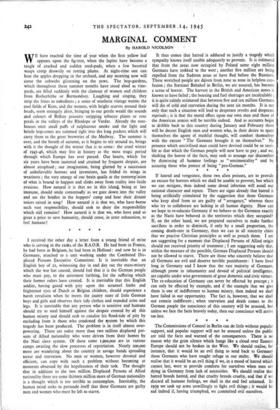I received the other day a letter from a young
friend of mine who is serving in the ranks of the B.A.O.R. He had been in France, he had been in Belgium, he had been in Holland : and now he is in Germany, attached to a unit working under the Combined Dis- placed Persons Executive Committee. It is inevitable that an English boy of 21, witnessing day in and day out the mass-misery which the war has caused, should feel that it is the German people who must pay, to the uttermost farthing, for the suffering which their former rulers have created. It is inevitable that this English soldier, having gazed with pity upon the scrannel limbs and frightened eyes of Dutch or Belgian children, should experience a harsh revulsion when he meets the jaunty stare of little German boys and girls and observes their tidy clothes and rounded arms and legs. It is inevitable that any person who is sensitive and humane should try to steel himself against the despair created by all this human misery and should seek to canalise his flood-tide of pity by excluding from it those who condoned the system by which this tragedy has been produced. The problem is in itself almost over- powering. There are today more than two million displaced per- sons of Allied nationality who were driven from their homes by the Nazi slave system. Of these some 1,900,000 are in various camps awaiting the slow processes of repatriation. Nearly 200,000 more are wandering about the country in savage bands spreading terror and starvation. No men or women, however devoted and efficient, can cope with such a problem without becoming at moments obsessed by the hopelessness of their task. The thought that in addition to the two million Displaced Persons of Allied nationality there are some thirteen million more of German nationality is a thought which is too terrible to contemplate. Inevitably, the human mind seeks to persuade itself that these Germans are guilty men and women who must be left to starve.


























 Previous page
Previous page